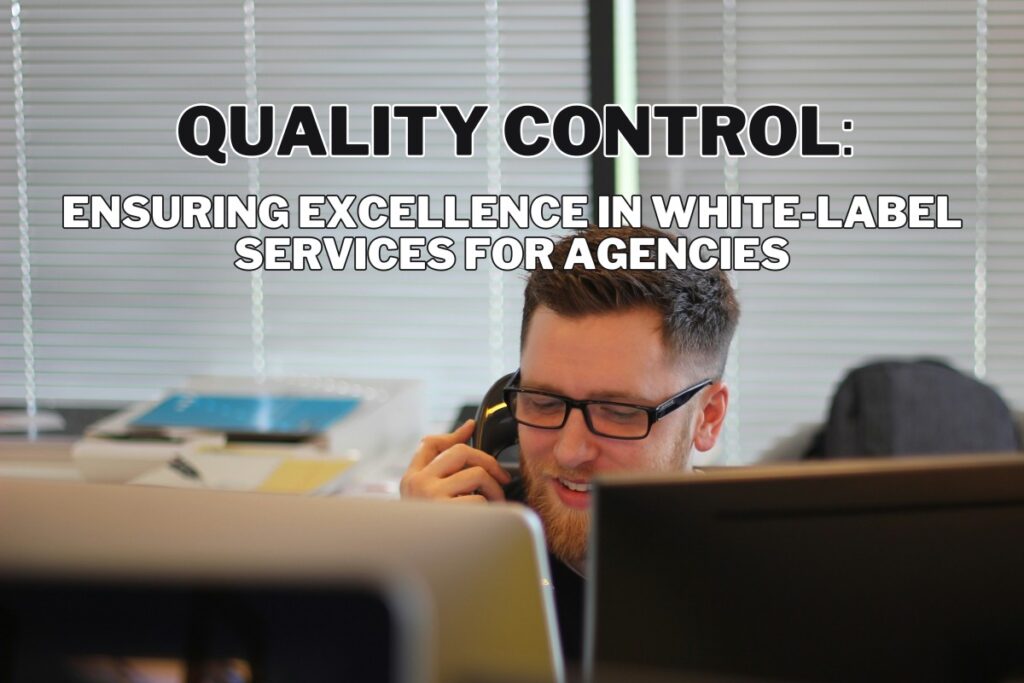
In the competitive world of digital marketing, quality is paramount. As digital marketing agencies strive to deliver exceptional results for their clients, maintaining high standards of quality is essential.
This is particularly true when it comes to white-label services, where agencies rely on third-party providers to deliver services under their brand name. This is also known as “outsourcing.”
To ensure excellence in white-label services and uphold their reputation, agencies must implement robust quality control measures.
Here are seven essential tips to help agencies maintain quality and deliver excellence in their outsourcing or white-label services:
1. Establish Clear Expectations
The foundation of quality control in white-label services is establishing clear expectations with third-party providers from the outset.
This includes defining project requirements, timelines, deliverables, and quality standards. By ensuring that all parties involved are aligned on expectations, agencies can minimize misunderstandings and mitigate potential issues down the line.
Clear communication is key to successful collaboration and ultimately delivering high-quality results for clients.
2. Conduct Thorough Vendor Screening
Before partnering with a third-party provider for white-label services, it’s essential to conduct thorough vendor screening.
This involves assessing the vendor’s track record, reputation, capabilities, and quality control processes.
Look for vendors with a proven track record of delivering high-quality work and who demonstrate a commitment to excellence.
Additionally, consider conducting interviews, requesting samples, and checking references to ensure compatibility and reliability.
3. Provide Comprehensive Training and Guidelines
To ensure consistency and quality in white-label services, provide comprehensive training and guidelines to third-party providers.
This includes educating them about your agency’s brand identity, voice, style guidelines, and client expectations.
Provide detailed briefs, style guides, and examples to help vendors understand your agency’s standards and requirements.
By investing in training and guidance, agencies can empower third-party providers to deliver work that aligns with their brand and meets client expectations.
4. Implement Robust Quality Assurance Processes
Quality assurance is a critical aspect of maintaining excellence in white-label services.
Implement robust quality assurance processes to review and evaluate the work delivered by third-party providers. This may include conducting regular audits, spot-checking deliverables, and soliciting client feedback.
Identify key performance indicators (KPIs) to measure quality and ensure that vendors meet or exceed established benchmarks.
Continuously monitor performance and address any issues promptly to maintain high standards of quality.
5. Foster Open Communication Channels
Effective communication is essential for successful collaboration in white-label services. Foster open communication channels with third-party providers to address any questions, concerns, or feedback promptly.
Encourage vendors to communicate proactively about project progress, challenges, and potential issues.
Establish regular check-ins, status updates, and feedback sessions to keep lines of communication open and ensure alignment on project goals and expectations.
By fostering a culture of transparency and collaboration, agencies can strengthen relationships with third-party providers and maintain quality standards.
Using project management tools like TeamWork, ClickUp, Asana, and other popular software can help with this.
6. Conduct Regular Performance Reviews
Regular performance reviews are an essential tool for evaluating the quality of white-label services and identifying areas for improvement.
Schedule periodic reviews with third-party providers to assess their performance against established criteria and KPIs.
Provide constructive feedback and guidance to help vendors enhance their performance and address any deficiencies.
Use performance reviews as an opportunity to recognize and reward exceptional work and reinforce expectations for quality and excellence.
7. Continuously Evaluate and Iterate
Quality control is an ongoing process that requires continuous evaluation and iteration. Regularly assess the effectiveness of quality control measures and identify areas for improvement.
Solicit feedback from clients, internal teams, and third-party providers to gain insights into areas of strength and opportunities for enhancement.
Use data and analytics to track performance metrics and identify trends over time.
Continuously iterate on quality control processes based on feedback and insights to ensure ongoing excellence in white-label services.
In conclusion, maintaining excellence in white-label services requires a proactive approach to quality control.
By establishing clear expectations, conducting thorough vendor screening, providing comprehensive training and guidelines, implementing robust quality assurance processes, fostering open communication channels, conducting regular performance reviews, and continuously evaluating and iterating, agencies can uphold high standards of quality and deliver exceptional results for their clients.
Ready to elevate the quality of your white-label services? Implement these seven essential outsourcing tips to ensure excellence and deliver exceptional results for your clients.
Contact us today to learn how we can help you optimize your white-label services and achieve your business goals.
